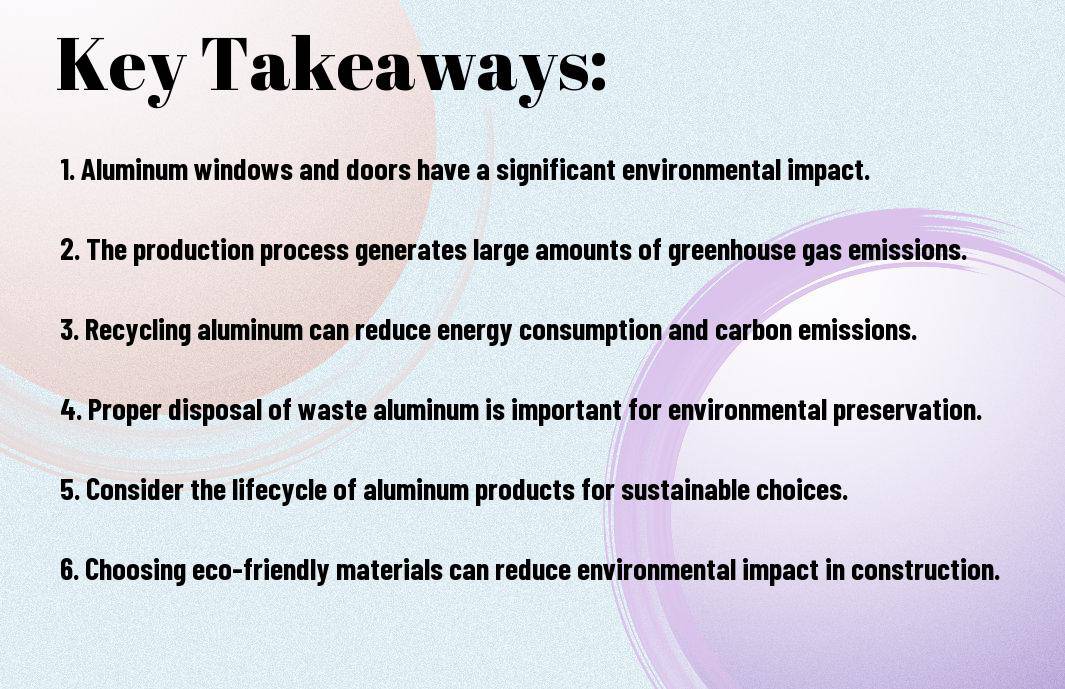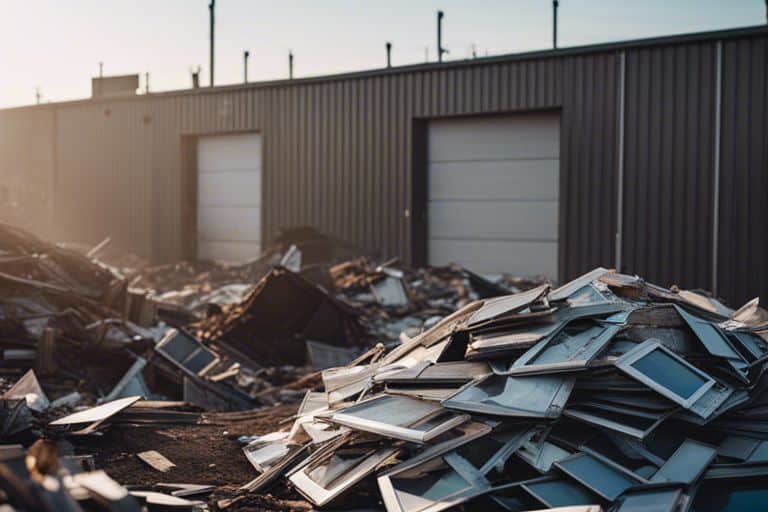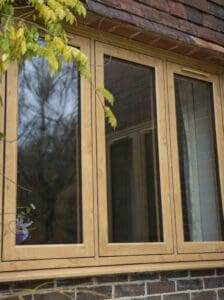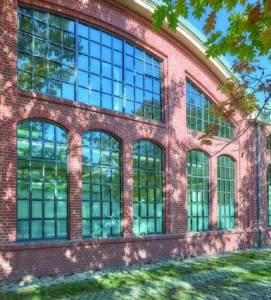Alienated by its durability and sleek appearance, aluminum is a popular choice for windows and doors in modern construction. However, the environmental impact of waste aluminum windows and doors is a pressing concern that needs attention. When disposed of in landfills, aluminum windows and doors can take centuries to decompose, releasing harmful substances into the environment. The production of aluminum also requires a significant amount of energy and contributes to carbon emissions. On the other hand, recycling waste aluminum windows and doors can significantly reduce the environmental impact. By salvaging the metal and reusing it, we can conserve natural resources, reduce energy consumption, and minimise carbon emissions. For those looking to further mitigate their impact on the environment, considering Environmental Windows: Eco-Friendly Windows could be a great alternative to traditional aluminum options.
Key Takeaways:
- Aluminum windows and doors have a significant environmental impact due to their production process and disposal.
- Recycling of waste aluminum windows and doors can help reduce the environmental impact by saving energy and natural resources.
- Proper disposal of waste aluminum windows and doors is crucial to prevent pollution and harm to the environment.
- Sustainable alternatives to aluminum windows and doors, such as wood or uPVC, can help minimise the environmental impact of construction and renovation projects.
- Government regulations and industry standards play a crucial role in managing the environmental impact of waste aluminum windows and doors.

The Life Cycle of Aluminum Windows and Doors
Production and Installation
During the production and installation stage, aluminium windows and doors require significant amounts of energy and resources. The mining and extraction of aluminium ore, as well as the manufacturing process, contribute to high carbon emissions and environmental impact. The transportation and installation of these products also add to their overall carbon footprint.
It is crucial to consider the use of recycled aluminium and energy-efficient manufacturing processes to mitigate the environmental impact during this stage. The installation process should also be carried out with care to ensure minimal wastage and maximum efficiency.
Usage and Energy Efficiency
Once installed, aluminium windows and doors have a long lifespan and can contribute to energy efficiency in buildings. The material is durable and low-maintenance, making it a sustainable choice for construction. However, proper insulation and sealing are essential to ensure optimal energy efficiency and to prevent heat loss or gain.
Regular maintenance and upgrades can further improve the energy performance of aluminium windows and doors, reducing the overall environmental impact over their lifespan.
It is important to consider the design and orientation of buildings to maximise natural light and ventilation, reducing the need for artificial heating and cooling systems. Additionally, the use of double or triple glazing can significantly improve the energy efficiency of aluminium windows.

Environmental Hazards of Waste Aluminum
When waste aluminum windows and doors are not properly disposed of, they can pose significant environmental hazards. From toxicity and pollution to challenges in waste management, the impact of aluminum waste on the environment is a pressing issue that needs to be addressed.
Toxicity and Pollution
The improper disposal of waste aluminum windows and doors can lead to the release of toxic substances and pollutants into the environment. Aluminium is known to be highly toxic, particularly to aquatic life. When aluminum waste ends up in landfills or is incinerated, it can leach into the soil and water, causing severe pollution and harming ecosystems.
Challenges in Waste Management
One of the major challenges in managing waste aluminum windows and doors is the lack of effective recycling infrastructure. While aluminum is 100% recyclable, many localities do not have the necessary facilities or programmes in place to ensure that it is properly recycled. This leads to a large amount of aluminium waste ending up in landfills, exacerbating the environmental impact.
Additionally, the lightweight nature of aluminum makes it particularly challenging to manage, as it can easily be carried by wind and water, leading to widespread environmental contamination if not properly contained.
Recycling and Reuse of Aluminum
Benefits of Recycling Aluminum
Recycling aluminium offers numerous environmental benefits, making it an essential component of sustainable waste management. Firstly, recycling aluminium saves a substantial amount of energy compared to the production of new aluminum from raw materials. This is because the process of extracting aluminium from its ore, bauxite, is energy-intensive. Secondly, recycling aluminium reduces the need for mining, which is a destructive and environmentally damaging activity. By diverting aluminium from landfills and incinerators, recycling also helps to reduce the emission of greenhouse gases and minimises the overall environmental impact of waste disposal.
Innovative Reuse Solutions
Aside from recycling, innovative reuse solutions for aluminium windows and doors have gained popularity in the sustainable construction industry. Upcycling used aluminium frames into new products or integrating them into new architectural designs helps to extend the lifespan of the material and minimises the demand for virgin aluminium. This not only reduces the environmental footprint of the construction industry, but also promotes the concept of circular economy, where materials are reused and repurposed to prevent them from becoming waste.
One example of innovative reuse solutions for aluminium is the concept of ‘cradle to cradle’ design, where products are designed with the intention of being continuously recycled or wholesomely reused, thereby creating a closed-loop system. By embracing innovative reuse solutions, we can significantly reduce the amount of aluminium waste being sent to landfill, while also conserving natural resources and energy.
Policies and Best Practices
Effective policies and best practices are essential for managing the environmental impact of waste aluminium windows and doors. These guidelines not only ensure proper disposal and recycling of these materials but also encourage sustainable manufacturing and production processes. By following these policies and best practices, the industry can significantly reduce its environmental footprint and contribute to a more sustainable future.
Regulation and Enforcement
Regulation and enforcement play a crucial role in ensuring that waste aluminium windows and doors are managed in an environmentally responsible manner. Government regulations and enforcement measures help to monitor and control the disposal and recycling of aluminium products, preventing illegal dumping and encouraging responsible waste management. It is essential that these regulations are strictly enforced to protect the environment and public health from the dangerous effects of improper waste disposal.
Industry Initiatives for Sustainable Practices
The aluminium industry has been proactive in implementing initiatives to promote sustainable practices. Many companies have adopted innovative technologies and processes to reduce waste generation, improve recycling rates, and minimise the environmental impact of aluminium windows and doors. These initiatives not only demonstrate the industry’s commitment to positive environmental stewardship but also contribute to the promotion of a circular economy and the preservation of natural resources.
Industry initiatives for sustainable practices include efforts to develop more efficient recycling methods, reduce energy consumption in manufacturing processes, and promote the use of recycled aluminium in new products. These initiatives are essential for advancing sustainable practices within the industry and achieving long-term environmental benefits.

The Environmental Impact of Waste Aluminum Windows and Doors
In conclusion, the environmental impact of waste aluminum windows and doors is a significant concern that requires immediate attention. The production, installation, and disposal of these products contribute to greenhouse gas emissions, energy consumption, and waste generation. It is crucial for manufacturers, suppliers, and consumers to adopt sustainable practices such as recycling, reusing, and reducing the use of aluminum in order to minimise the environmental impact. Government policies and regulations also need to be implemented to ensure responsible waste management and promote the use of eco-friendly materials. By taking proactive measures, we can mitigate the detrimental effects of waste aluminum windows and doors on the environment and work towards a more sustainable future.
FAQ
Q: What is the environmental impact of waste aluminum windows and doors?
A: The environmental impact of waste aluminum windows and doors arises from the energy-intensive production process and the difficulty in recycling and disposing of these materials, leading to increased carbon emissions and landfill waste.
Q: How does the production of aluminum windows and doors affect the environment?
A: The production of aluminum windows and doors requires a significant amount of energy, leading to higher carbon emissions. Additionally, the extraction of raw materials such as bauxite and the refining process further contribute to environmental degradation.
Q: What are the challenges in recycling waste aluminum windows and doors?
A: Recycling waste aluminum windows and doors is challenging due to the complex nature of the materials, including coatings and insulation. The separation process is often time-consuming and costly, making it less economically viable for recycling facilities.
Q: What are the alternatives to disposing of waste aluminum windows and doors?
A: Instead of disposal, reusing and repurposing waste aluminum windows and doors is a more sustainable option. Upcycling into new products or refurbishing for use in construction projects can help reduce environmental impact.
Q: How can we reduce the environmental impact of waste aluminum windows and doors?
A: To minimise the environmental impact, it’s crucial to focus on reducing waste generation through efficient production processes, promoting recycling initiatives, and investing in sustainable alternatives such as eco-friendly materials and designs.













